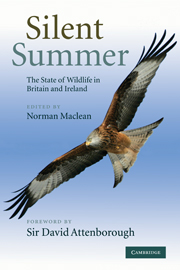Book contents
- Frontmatter
- Contents
- List of contributors
- Foreword
- Preface
- Acknowledgements
- List of abbreviations
- 1 Introduction
- PART I FACTORS DRIVING CHANGES IN WILDLIFE
- PART II CONSERVATION IN ACTION
- 12 Conservation in action in Britain and Ireland
- 13 Wildlife in the UK Overseas Territories
- 14 The United Kingdom's role in international conservation
- PART III THE CASE HISTORIES
- Glossary
- Name index
- Subject index
- Plate section
- References
13 - Wildlife in the UK Overseas Territories
Published online by Cambridge University Press: 05 August 2012
- Frontmatter
- Contents
- List of contributors
- Foreword
- Preface
- Acknowledgements
- List of abbreviations
- 1 Introduction
- PART I FACTORS DRIVING CHANGES IN WILDLIFE
- PART II CONSERVATION IN ACTION
- 12 Conservation in action in Britain and Ireland
- 13 Wildlife in the UK Overseas Territories
- 14 The United Kingdom's role in international conservation
- PART III THE CASE HISTORIES
- Glossary
- Name index
- Subject index
- Plate section
- References
Summary
Summary
UK Overseas Territories (UKOTs) are important parts of the UK, not foreign countries. Although small in size, they support far more endemic taxa and other globally important biodiversity than does Britain and Ireland.
The devastation of UKOT wildlife and ecosystems following their discovery by humans continues, with severe impacts, notably from:
• Loss of natural ecosystems
• Invasive species
• Over-exploitation and its side-effects
• Pollution, especially that leading to climate change.
UKOT- and British-based conservation bodies are brought together in the UK Overseas Territories Conservation Forum (UKOTCF), which has also encouraged interest by UK Government. This included finding ways, including ‘Environment Charters’, of addressing the problem that UK Government is responsible for international environmental commitments, but the UKOT Government is responsible for legislation and enforcement.
Endemic species – and endemic genera – are still becoming globally extinct on UK territory. Several species are down to the last few individuals, and 240 species remain at serious risk in the UKOTs (compared with 59 at risk amongst those occurring in Britain).
A major problem is lack of resources. The economies of the UKOTs are too small to address this alone. As UK territory, the UKOTs are ineligible for most international grant sources, but receive little support from the UK's conservation budget either. The UK Government spends around 500 times less on conservation in UKOTs than in Great Britain and Northern Ireland. Per endemic species, the British Government spends about four orders of magnitude less. […]
- Type
- Chapter
- Information
- Silent SummerThe State of Wildlife in Britain and Ireland, pp. 184 - 215Publisher: Cambridge University PressPrint publication year: 2010
References
- 1
- Cited by



